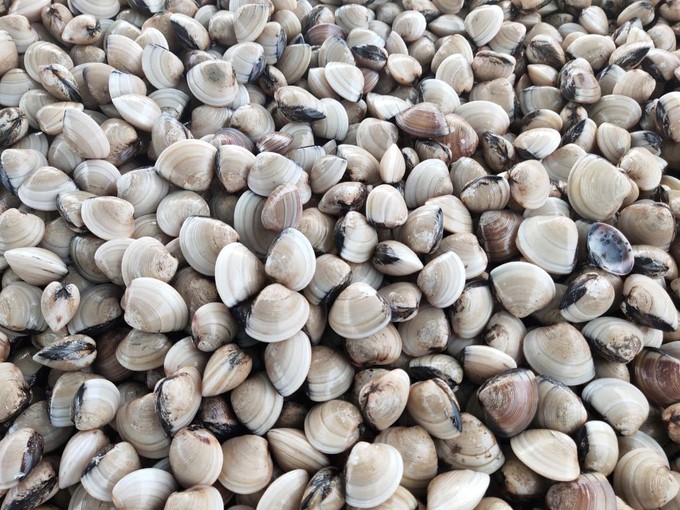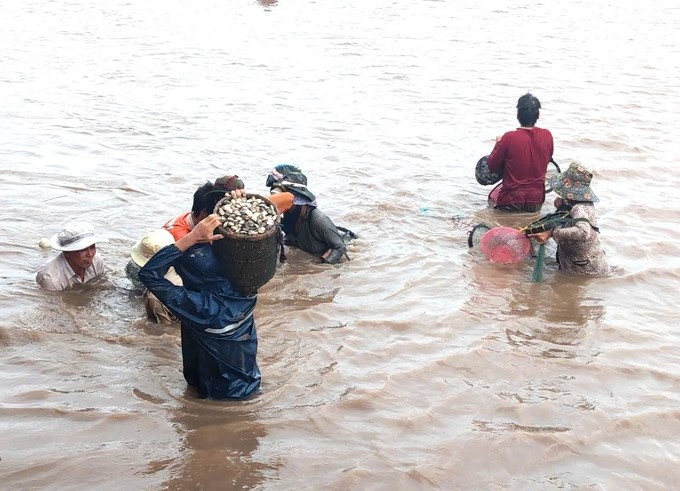November 22, 2025 | 23:37 GMT +7
November 22, 2025 | 23:37 GMT +7
Hotline: 0913.378.918
November 22, 2025 | 23:37 GMT +7
Hotline: 0913.378.918

Ben Tre province is implementing research topics to comprehensively evaluate the suitability of clam grounds. Photo: Kim Anh.
To maintain and be re-certified MSC in the coming years, the Ben Tre Department of Agriculture and Rural Development of Ben Tre province determines that it is compulsory to build a stable, sustainable, and effective clam farming profession, contributing to cooperative members' increased income and the province's socio-economic development. Along with that, the province's agriculture sector also provides orientations to help cooperatives develop appropriate exploitation and protection plans in the direction of both exploiting and regenerating natural resources.
Recently, the Ben Tre Department of Agriculture and Rural Development established a Steering Committee to support the development of the clam industry in the province. Members include department leaders, the Fisheries Association, the Sub-Department of Fisheries, the Quality Management Sub-Department, leaders of districts and communes, and clam farming cooperatives.
With coordination between specialized units, the agriculture sector will monitor the development of clam seeds and parent clams and the intertidal situation in clam farming areas. In particular, in the context of climate change, hot sun, high salinity, etc., the sector will promptly have solutions to support and prevent diseases in clams.
At the same time, the Ben Tre Department of Agriculture and Rural Development also coordinates with departments and branches in the province to implement research topics to have a scientific database and comprehensive assessment of the suitability of clam grounds in the context of the clam fields moving further and further away due to encroachment.
Regularly strengthen environmental monitoring to have early warnings about disease situations in clams. In addition, specialized agencies periodically collect samples and control food safety and hygiene for clams to ensure quality standards. On the other hand, support cooperatives to update information on clam field and clam ground data, ensuring compliance with the principles of MSC standards.

Clams are currently one of the main exported aquatic products of Ben Tre province. Photo: Kim Anh.
The agriculture sector also regularly deploys human resource training. Recently, the Ben Tre Department of Agriculture and Rural Development has coordinated with the Provincial Cooperative Alliance to build a system of cooperatives that is strong enough, transparent, and clear.
"When problems arise, the Provincial Department of Agriculture and Rural Development and localities will promptly resolve them to avoid dissatisfaction among cooperative members. Poor management will lead to clam grounds and clam fields being affected," said Mr. Nguyen Van Buoi, Deputy Director of the Ben Tre Department of Agriculture and Rural Development.
The fact that clam farming areas in the Mekong Delta are certified according to international standards such as ASC and MSC is a good condition to promote the brand, promote trade, and expand consumption markets.
However, it is necessary to associate farming area planning with a development orientation along the value chain, traceability, and meeting the conditions of the given standards.
With the current clam consumption situation as well as the development potential that is on a very good track for clams, Ben Tre province in particular and the Mekong Delta region in general have carried out a number of research projects and applied science and technology to seed production or parent stock to create the best seed source for reproduction and meet the needs of commercial farming development.

Currently, the production consciousness of cooperative members at clam cooperatives in Ben Tre province has clearly changed, both exploiting and regenerating natural resources. Photo: Kim Anh.
In addition, localities also pay attention to researching and deeply applying biotechnology (genetics) in the process of developing parent clams or developing information technology to monitor and warn the environment.
Thereby, creating a comprehensive and fundamental solution for quality seed sources to provide for farmers, especially parent clams, with uniform product quality meeting market requirements.
The clam farming, management, and exploitation profession in Ben Tre has been recognized by the Marine Stewardship Council (MSC) as meeting MSC certification standards for the third time in the 2024–2029 period (valid from May 23, 2025, until March 22, 2029).
According to Mr. Nguyen Van Buoi, Deputy Director of the Ben Tre Department of Agriculture and Rural Development, to continue to maintain, develop, and exploit clams sustainably according to MSC standards, it is the responsibility of state management agencies, especially the Department of Agriculture and Rural Development, to support cooperatives and people's communities.
Translated by Thu Huyen

(VAN) Results from the Sustainable Durian Model Project in Dak Lak have confirmed the critical role of Yara Viet Nam in transferring advanced nutritional solutions to farmers.

(VAN) In Tuyen Quang province, livestock farmers have introduced effective models and innovative practices that significantly strengthen African Swine Fever prevention and control efforts.

(VAN) This is the study conducted by IRRI and Can Tho University on the rice straw value chain in Mekong Delta showing an economic potential of more than 6.6 trillion VND/year.

(VAN) By participating in cooperative economics, many farmers in Tay Ninh have overcome hardship, mastered clean dragon fruit cultivation techniques.

(VAN) The crossbreeding program in the former Binh Dinh province (now part of Gia Lai) has shown signs of decline, and urgent measures are needed to revive it and sustain past achievements.

(VAN) The agricultural sector agreed on a roadmap to pilot the MRV protocol and expand low-emission rice production from the 2025-2026 winter-spring crop.

(VAN) Agricultural extension officers in Quang Ninh do more than transmit knowledge; they have become a steadfast support system for farmers on the path to sustainable agricultural development.